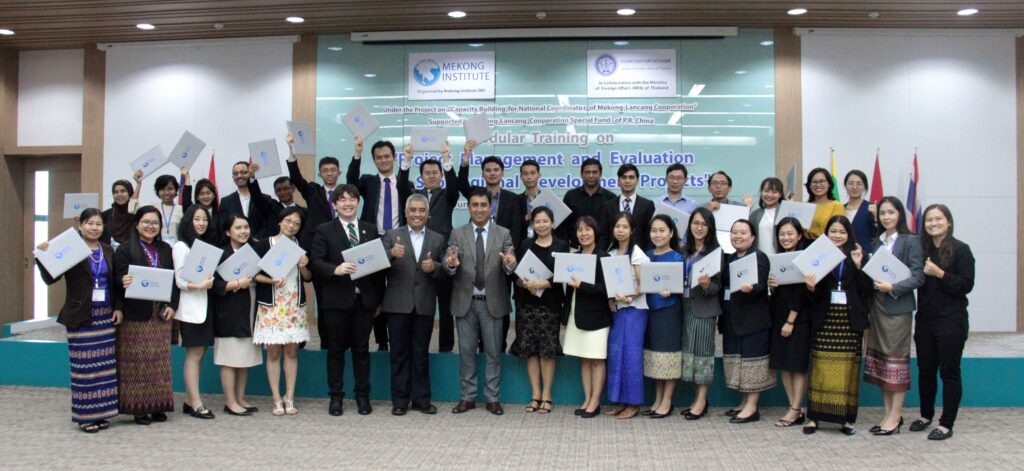The one-week modular training program on Project Management and Evaluation of Regional Cooperation Projects was organized by Mekong Institute (MI) on June 24-28, 2019. The training is part of the Project on Capacity Building for National Coordinator of Mekong–Lancang Cooperation, funded by the Lancang Mekong Cooperation Special Fund (LMCSF).
The modular training was attended by 29 mid- to senior-level officials from the Ministry of Foreign Affairs and line ministries related to commerce, industry, labour and social affairs, public works and transport, agriculture, rural affairs, forestry, natural and water resource, and environment of the six Mekong-Lancang countries as well as representatives from Neighbouring Countries Economic Development Cooperation Agency (NEDA), Thailand.
In his Welcome Remarks, Mr. Madhurjya Kumar Dutta, Director of MI Trade and Investment Facilitation (TIF) Department, expressed his warm welcome to all the officials and provided an overview of the project as well as the training program. On behalf of Chinese Ambassador H.E. Mr. Lyu Jian, Mr. Ge Tang, Director of the Political Division of the Embassy of the People’s Republic of China in Thailand, conveyed messages of congratulation and appreciation to the Ministry of Foreign Affairs of Thailand and MI. He expressed optimism that the training would contribute to stronger ties between China and ML countries and fully unleash the potential of sub-regional cooperation mechanisms in the region. He also emphasized the importance of instilling positive energy and collaboration and streamlining efforts of regional economic integration along with other cooperation mechanisms, such as GMS and ACMECS, as the driving forces toward sustainable development of the Mekong-Lancang countries.
The training program covered five modules on topics such as (i) Introduction to Project Management and Regional Development, (ii) Cooperation and Integration, (iii) Project Initiation: Project Conceptualization and Identification, (iv) Project Formulation and Appraisal, and (v) Project Planning and Implementation, Project Control, and Projects’ Monitoring and Evaluation. To equip the officials with practical knowledge, actual case studies on MLC’s priority areas including (i) connectivity, (ii) production capacity, (iii) cross-border trade, (i) water resources management, and (v) agriculture and poverty reduction were introduced and used in group assignments and practices during the workshop sessions.
Concluding the training program, Mr. Madhurjya Kumar Dutta, expressed his gratitude to the resource persons and participants for making the event a success, and highlighted the importance of transfer of acquired knowledge by implementing action plans (APs) and contributing to formation and implementation of large-scale, national and multinational projects in order to deepen impact of the Mekong-Lancang Cooperation in the sub-region.








